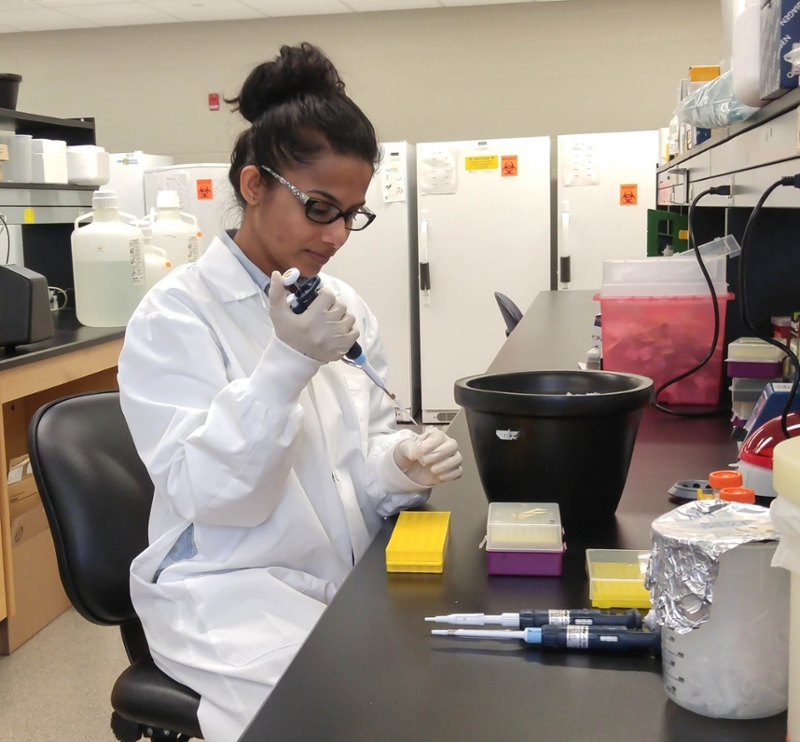
Realizing the research dream
Nilusha Malmuthuge has overcome obstacles academic and geographic on a journey that has earned her a prestigious Banting Postdoctoral Fellowship at the University of Saskatchewan (U of S).
By Cat BonnerAn innovative proposal to research gut microbiota (a complex collection of bacteria present in the digestive tract) in newborn lambs won Sri Lanka-born Malmuthuge the two-year fellowship, for which she will receive $140,000 in research funding from the Natural Sciences and Research Council of Canada (NSERC).
She is completing her research at the U of S Vaccine and Infectious Disease Organization and International Vaccine Centre (VIDO-InterVac), under the supervision of Canada Research Chair in Neonatal Mucosal Immunology Dr. Philip Griebel.
A long-held life goal led Malmuthuge to pursue a postgraduate degree in Canada, after completing a Bachelor’s degree in agriculture in her home country.
But health concerns almost halted her ambition.
She was preparing to leave Sri Lanka for an assistantship to research animal genetics at a Canadian university when her doctor discovered a tumour on her lungs which needed to be removed. The resultant delay in getting a Canadian study visa caused Malmuthuge to lose her assistantship.
It was some time later that a new opportunity from the University of Alberta (U of A) came her way, but it was not in her area of expertise.
Not to be deterred, Malmuthuge embraced the chance to challenge herself and pursue a new area of research in molecular biology.
“This was a life turning point for me,” she said. “What I thought was a failure turned out to be a success in disguise.”
Malmuthuge joined the U of A in 2009, where she quickly fostered a passion for her new field, and completed an M.Sc. and a Ph.D.
It was during her doctoral studies that she cultivated a fruitful working relationship with Dr. Griebel, who is a professor at the U of S School of Public Health, and she credits her Banting success to their connection.
“He is one of the best mucosal immunologists, and working with him inspired me to apply for the fellowship,” she said. “A good synergy between supervisor and applicant is essential, and I knew that together we could successfully go through the selection process.”
The esteemed Banting Fellowship provides funding to select outstanding postdoctoral researchers with the potential to be leaders in their field. Only 70 fellowships are awarded each year.
Malmuthuge’s current studies focus on collecting gut samples from fetal and neonatal lambs to explore the interactions between gut microbiota and the health of the host animal.
She plans to use her findings to create the first animal model which could help treat bacterial imbalances that cause diseases not just in young animals, but in human infants as well.
“The development of a proper animal model is extremely necessary at the moment, and very possible given that lambs share many commonalities in early life gut development with human infants,” Malmuthuge said.
Infants born prematurely or by Caesarean section have imbalanced gut microbiota, which makes them more prone to health conditions such as obesity, allergies, eczema and autism than full-term naturally born babies.
As these types of births are increasing, a young population is at risk from a wide range of diseases which would place significant demand on future healthcare systems.
With this in mind, Malmuthuge’s research could prove essential in finding solutions to prevent early life illness and improving the health of infants by promoting development of balanced gut microbiota.
But branching out into human research has not been plain sailing for Malmuthuge. She admits that initially, she struggled to win over the scientific community, which makes her Banting success all the sweeter.
“Research on cattle and sheep was largely considered irrelevant because of the anatomical differences to humans,” she explained.
“This is why receiving the Banting Fellowship is such a breakthrough for me. It shows the scientific community how important my research is, and the potential it has to improve human health.”
Learn more about the Banting Postdoctoral Fellowship.
